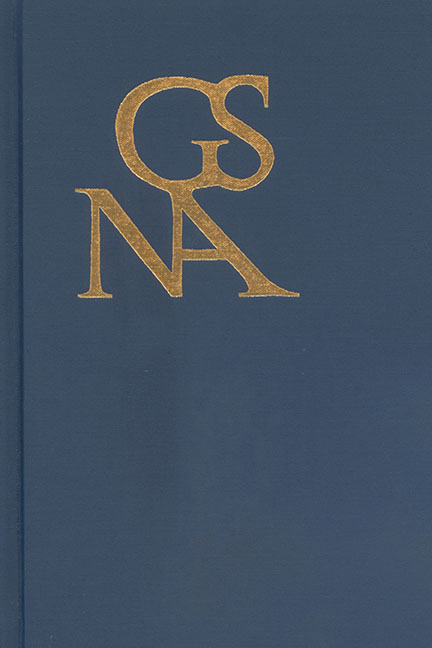Editors’ Preface
Published online by Cambridge University Press: 28 October 2020
Summary
WITH THE PUBLICATION of volume 27, we would like to take the opportunity to address some innovations. In this volume, we introduce an array of new formats through which we pursue research on Goethe, his age, and the long eighteenth century and seek to encourage new modes of collaboration, including, perhaps, communication across several volumes.
A range of articles that contribute to the rich and growing archive of scholarship on German eighteenth-century studies opens this issue. Helmut J. Schneider's article, based on a keynote address at the 2017 Atkins Goethe Conference, “Re-Orientations around Goethe,” highlights the eighteenthcentury genesis of the bourgeois subject's unitary experience of the natural world. With select readings of Goethean texts, Schneider explores the disjuncture that opens between the gaze and the corporeal. Moreover, Schneider's reading captures the destructive consequences of the emancipatory escape into nature for anthropocentric moments of modernity. The remaining articles, while devoted to discreet subjects, authors, and texts, invite fascinating cross-readings. Oliver Simons turns our attention to the representation of Werther's narrative pulse. Herder and Lessing also figure in the framework for this interpretation of metanarrative reflections on suicide and acts of ending; the essay extends the narratological focus of a special section in last year's volume (What is an Event?). The two following articles—a fascinating, opportune pairing—redirect our attention to Karl Philipp Moritz, through texts that engage with but go beyond the Magazin zur Erfahrungsseelenkunde. Richard Apgar explores the fraught process of subject formation through an examination of Moritz's writing on the individual, “Erinnerungen aus den frühesten Jahren der Kindheit” (memories from the earliest years of childhood). This interrogation of impressions and mediated memories leads to fresh insights into the construction of the modern individual. Mattias Pirholt continues the focus on Moritz in his analysis of ethical and aesthetic principles encompassed by the concept of disinterested love in “Versuch einer Vereinigung aller schönen Künste und Wissenschaften unter dem Begriff des in sich selbst Vollendeten.” The remaining contributions in this first section take up a challenge that our subfield has latently faced, namely to engage overtly or covertly with issues of relevancy; together the articles show how modern Goethe and his contemporaries are in our dialogues on belonging and identities, cultural legacies, and interdisciplinary inquiry.
- Type
- Chapter
- Information
- Goethe Yearbook 27 , pp. xi - xiiiPublisher: Boydell & BrewerPrint publication year: 2020

